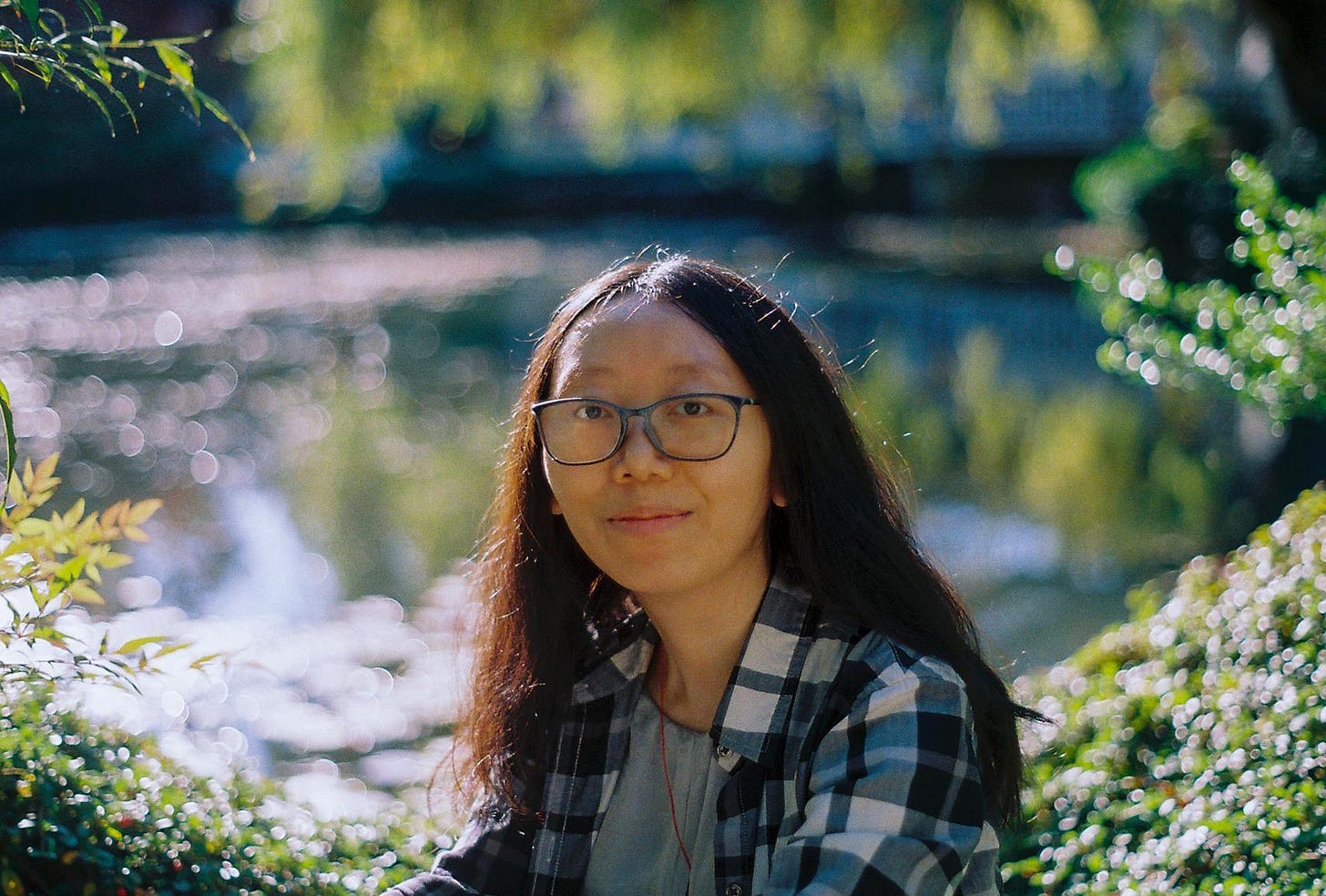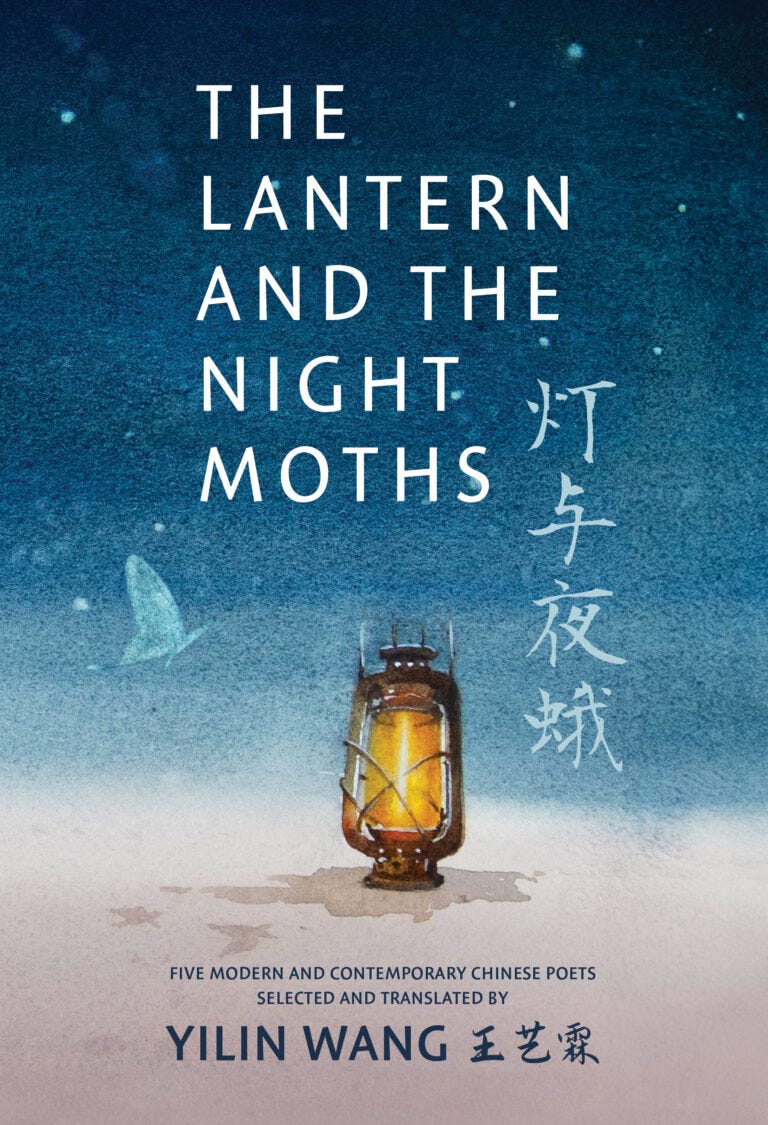#16: An Interview with Yilin Wang
"It’s important for me to put myself in the presence of other people where possible, because seeing other people around serves as a form of external accountability and body doubling."
Welcome to Archipel, an ongoing dialogue between me (Cara Waterfall) and other poets and creatives of all kinds, celebrating the ways we connect through mentorship, community and transitions.If you are interested in participating, please send me an email by replying to this newsletter or click here.
Archipel was also inspired by my very first poetry mentor, my father. When you purchase a subscription to this newsletter, you are paying into a scholarship fund in his name, which will support emerging poets.
To learn more about The Donald E. Waterfall Scholarship Fund, click here.
Thank you for reading!
Today's interview is with writer, poet, editor and Chinese-English translator Yilin Wang. Yilin’s creative work draws inspiration from Chinese mythology and folklore, and delves into the complexities of diaspora life, unearthing overlooked historical narratives and advocating for the preservation of heritage languages.
Her debut book The Lantern and the Night Moths (Invisible Publishing, 2024) is the first book of translations from Chinese — and from any Asian language — to win the John Glassco Translation Prize in the prize’s four-decade history. It features five modern and contemporary Chinese poets in translation along with original essays on the art of translation.
I loved how Yilin’s essays complemented the book’s translations with insights into her creative process. She writes beautifully in her essay “墟 废墟 | Remnants” about how the poet-translator does more than replicate the poem in another language — she transforms it into a world unto itself:
A poem, or its translation, is a legacy deposited by the person who
penned it, a careful arrangement of language that will one day out-
live its creator. Likewise, a poet–translator of the diaspora is also a
survivor; they have persisted against and even defied a publishing
ecosystem with structural biases, rules, and hierarchies. When I face
the page, surrounded by my many attempts to translate the word
“废墟,” which has no perfect equivalent in English, I feel as if I were
trying desperately to cultivate a morning glory that was growing
from a pile of rubble and debris. Meticulously, I embrace the task
of pruning the plant, cultivating the inexpressible until it begins
to multiply into words like “remnants,” “residue,” and “reminis-
cence.” Each and every iteration bears testimony to that which has
been lost, and even more importantly, all that courageously en-
dures. As the struggles subside, a newly translated poem emerges,
blooming once more.
Yilin has an MFA in Creative Writing from UBC and is a graduate of the Clarion West Writers Workshop. She has won the Dwarf Stars Award, CV2’s Foster Poetry Prize and ALTA’s Virtual Travel Fellowship, among others. She is also the recipient of grants from the Canada Council for the Arts, the BC Arts Council, and the Access Copyright Foundation.
As a passionate advocate for translators' rights, Yilin champions fair compensation and professional recognition in the literary translation industry. In 2023, she discovered that the British Museum had used her translations of poetry by Chinese feminist poet Qiu Jin without credit, permission or pay for over a month in their “China’s Hidden Century” exhibit. Read the full story here.
Yilin is currently working on the LiteraryJianghu 江湖书斋 Chinese Literature and Folklore Project, a series of creative digital works that she has created to engage with the wuxia (martial arts) fiction genre and related literary traditions.
To learn more about Yilin’s creative work and practice, follow her Facebook page and Instagram.
Who are you and how do you express your creativity or describe your art?
I’m a queer Chinese diaspora writer, poet, literary translator, and editor based on the unceded, ancestral, and occupied lands of the xʷməθkʷəy̓əm (Musqueam), Sḵwx̱wú7mesh (Squamish), and səlilwətaɬ (Tsleil-Waututh) Nations, known colonially as Vancouver, Canada. The Lantern and the Night Moths, my debut book of Chinese poetry translations and essays on the art and craft of translation, came out earlier in 2024.
The book features five modern and contemporary Chinese poets in translation.
It aims to provide an accessible introduction to modern Chinese poetry, especially for folks interested in Chinese literature, poetry and/or translation. The accompanying essays touch on a range of topics such as feminist and queer approaches to translation, translating from the position of diaspora, and working with ambiguity and implied contexts in poetry.
What keeps you coming back to creative work? Why is it worth doing?
I have always loved literature and storytelling, for as long as I remember.
My book is dedicated to maternal grandparents, who sparked my passion for Chinese folklore, legends, and poetry.
Ever since then, I have loved reading poetry and speculative fiction, which led me to become a writer and translator, and to continue to dedicate myself to creative literary pursuits.
What are your biggest challenges when it comes to maintaining a steady creative practice, and how have you overcome them?
As a writer who has been diagnosed with ADHD, I find it really challenging to follow any type of routine. When you have ADHD, you often lack awareness about how long a task might take, struggle with juggling competing priorities, and in general, have difficulties with focusing on any tasks that do not offer immediate, short-term rewards and stimulation.
I’m still trying to figure out what works best for me, but I have learned that it’s important for me to work outside of the home rather than alone. I write a lot in coffee shops, listening to music on repeat to keep myself stimulated. It’s important for me to put myself in the presence of other people where possible, because seeing other people around serves as a form of external accountability and body doubling.
I have also found that writing residencies to be incredibly helpful, because it allows me to take time away from the responsibilities of daily life, to spend a few weeks or longer to just focus on my creative work.
Over the past year, I completed the Writing Downtown residency in Vegas and Deer Lake residency in Burnaby. The residencies were very inspiring and helped me complete significant creative work.
Why does mentorship/community support matter?
Working as a writer (or a literary translator) can often be very isolating. You spend hours working alone, staring at the blank page and your own words. If you decide to seek traditional publication, it can take many months or years for a piece of writing or a book to reach public readers.
If you are from a marginalized background, or come from an environment where literary arts practices are not taken seriously, it can be especially hard to feel that your work is important and necessary, and to find support. I would not be the writer and translator I am today without the many friends, mentors, and communities that have supported me over the years.
Do you have a mentor?
In addition to pursuing formal education, like doing an MFA program and taking part in the Clarion West Writers Workshop, I also completed a formal mentorship through a grant I received from the BC Arts Council.
The grant gave me the resources to work with two mentors, Chinese Canadian author Larissa Lai and HK-based translator Gigi Chang, for a year. I found the experience life-changing. The in-depth guidance and knowledge they offered were invaluable and helped shape my debut book as well as my current projects-in-progress. It’s really helpful to have experienced writers and translators to talk to about the publishing journey, creative practices, and craft challenges. I strongly recommend writers to seek out formal and informal mentorship with writers they admire, where possible. It’s important to find mentors whose values and practices align with yours.
(Interview answers received via email November 28, 2024.)



I just recently learned about the concept of body doubling and I intend to try it this year to achieve my goal of writing more. Finding the right mentor seems like a tricky task, though. Still working on that. Thanks, Cara for these interviews!